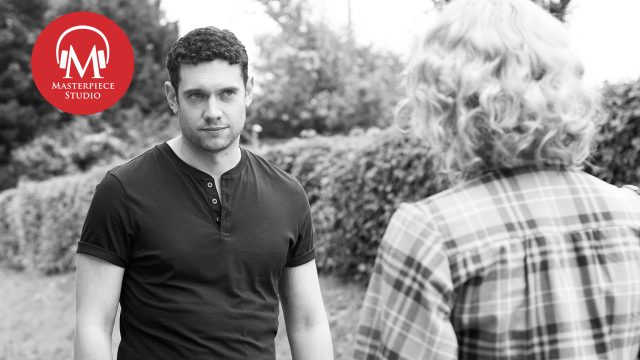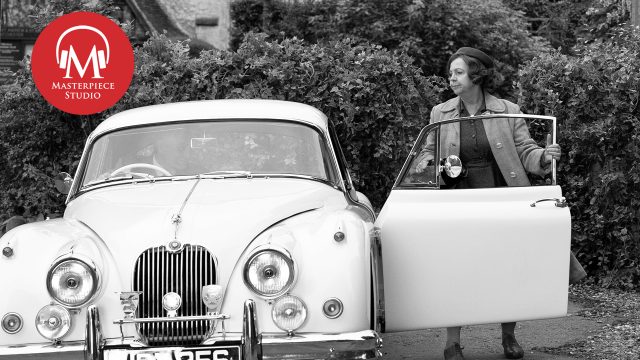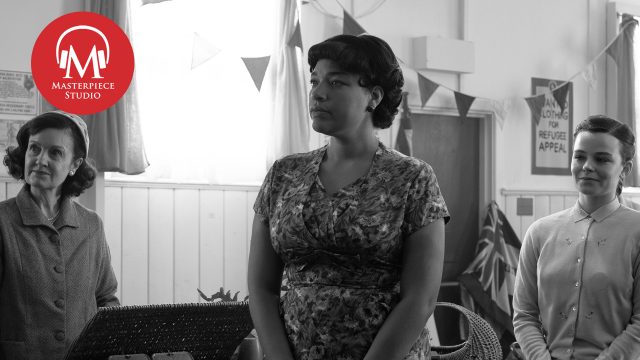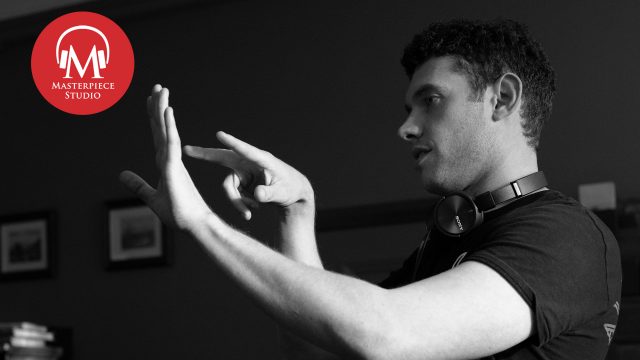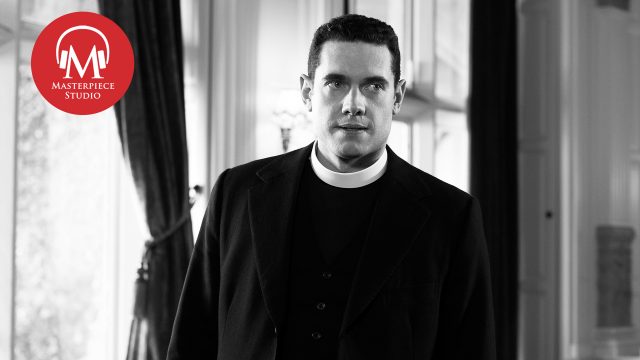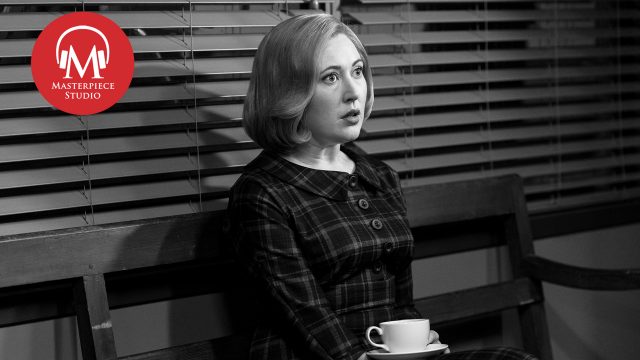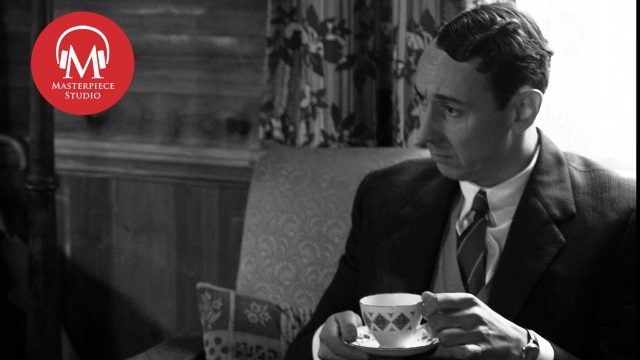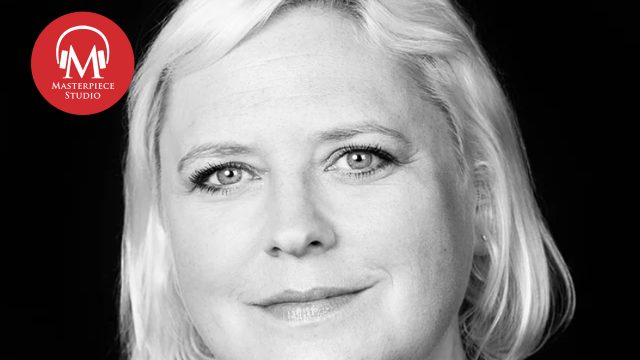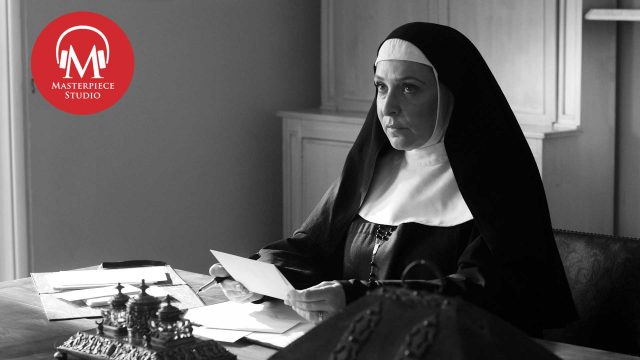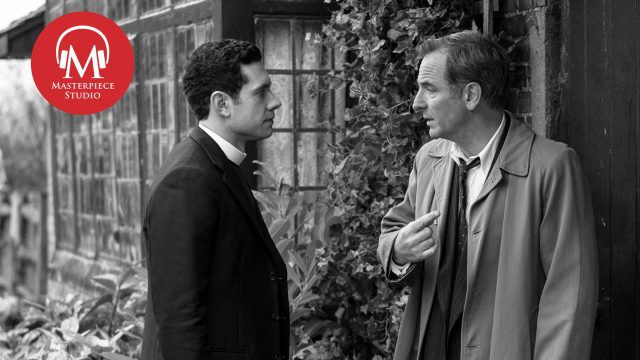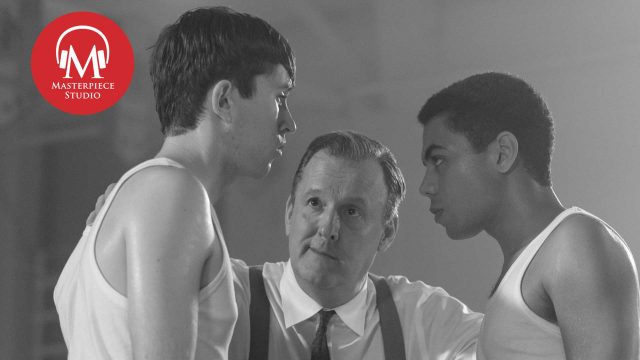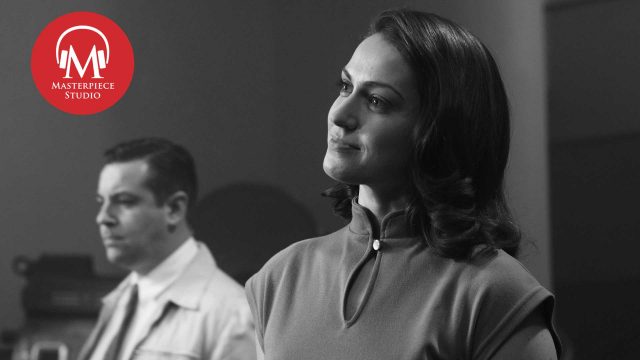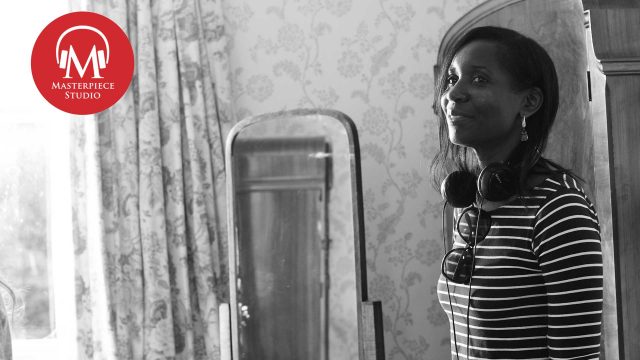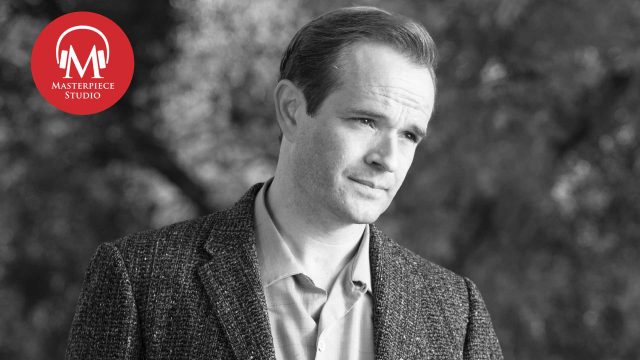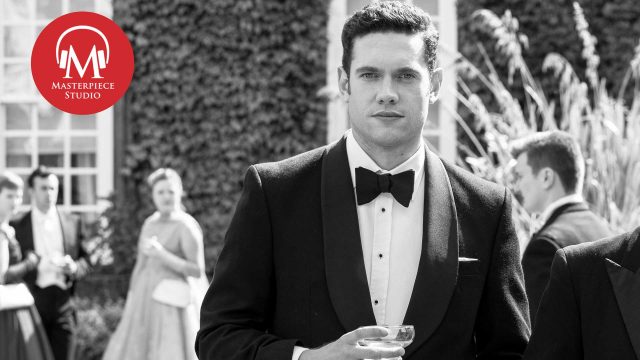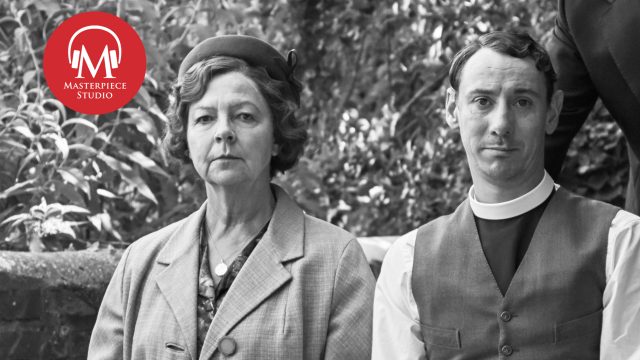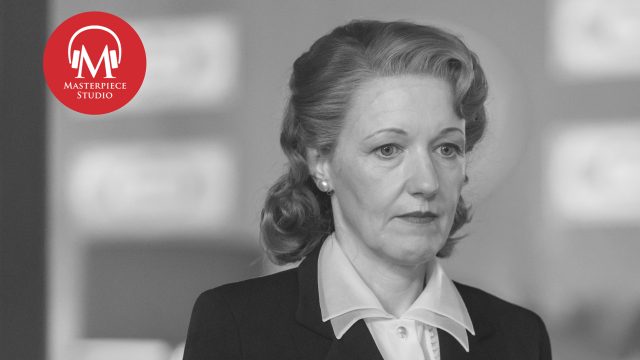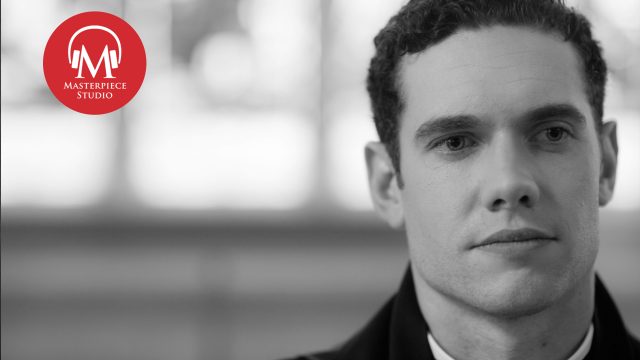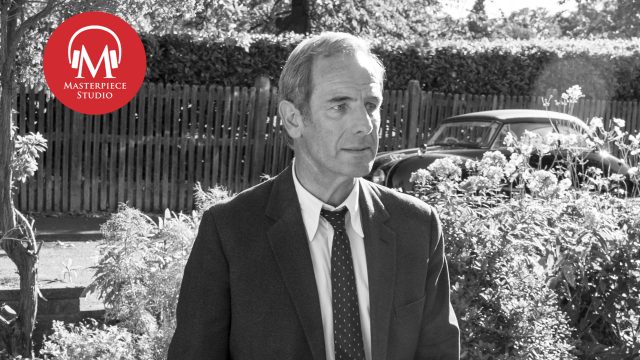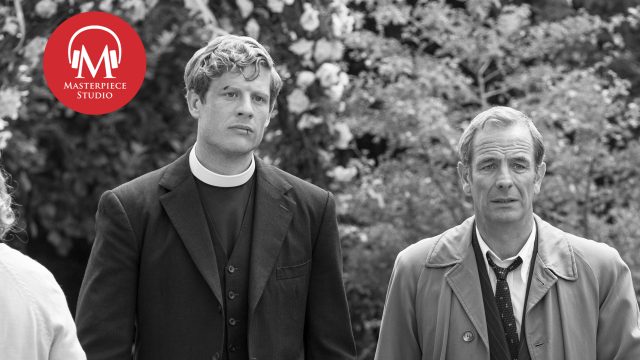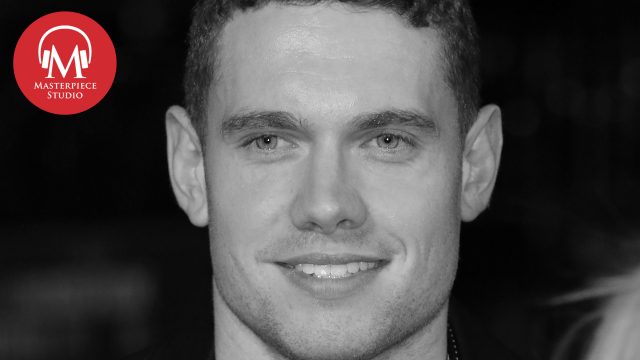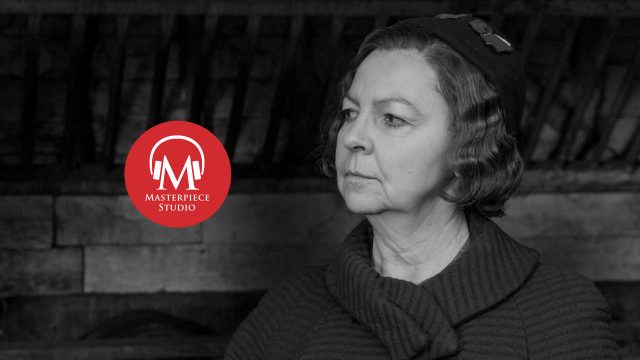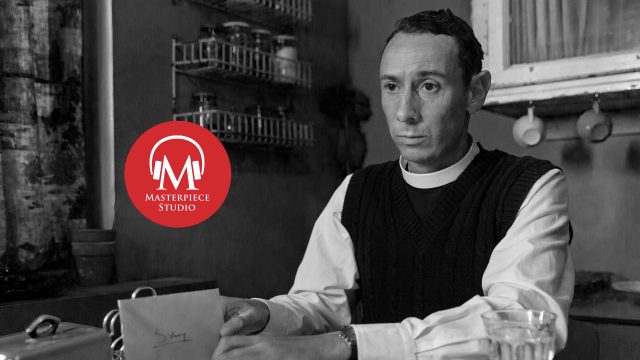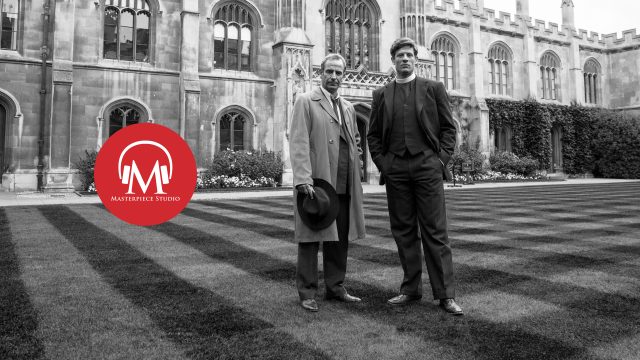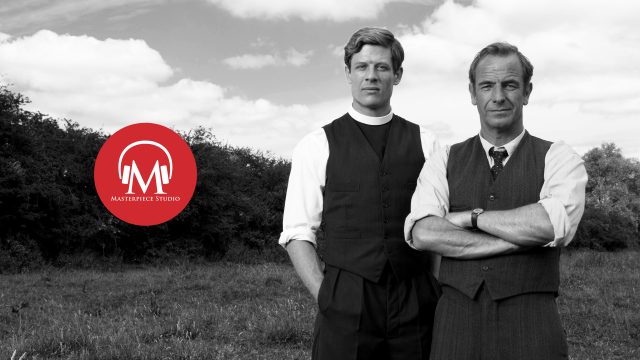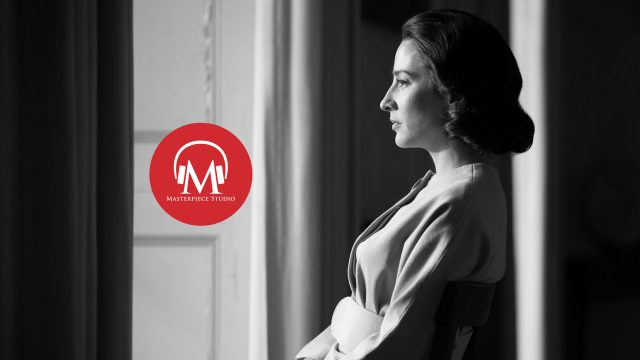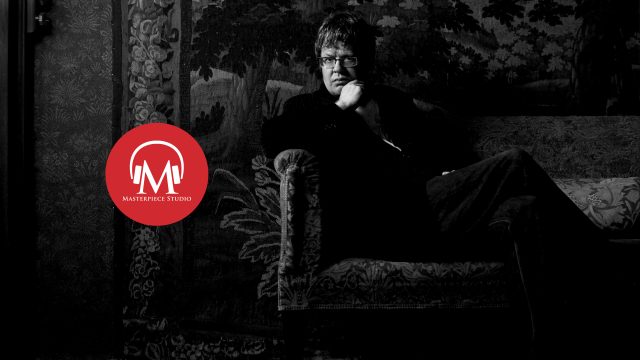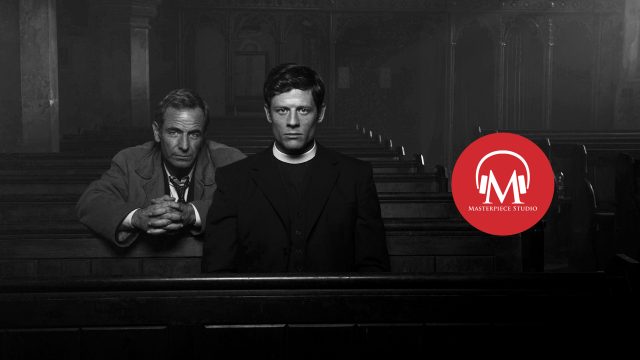Maybe it’s the season, maybe it’s real-world changes, maybe it’s the tide — but Grantchester head writer and series creator Daisy Coulam feels a positive vibe in the seventh iteration of her character-driven murder mystery. True, there’s still murder — but things are looking up for Will, Geordie and their found families.
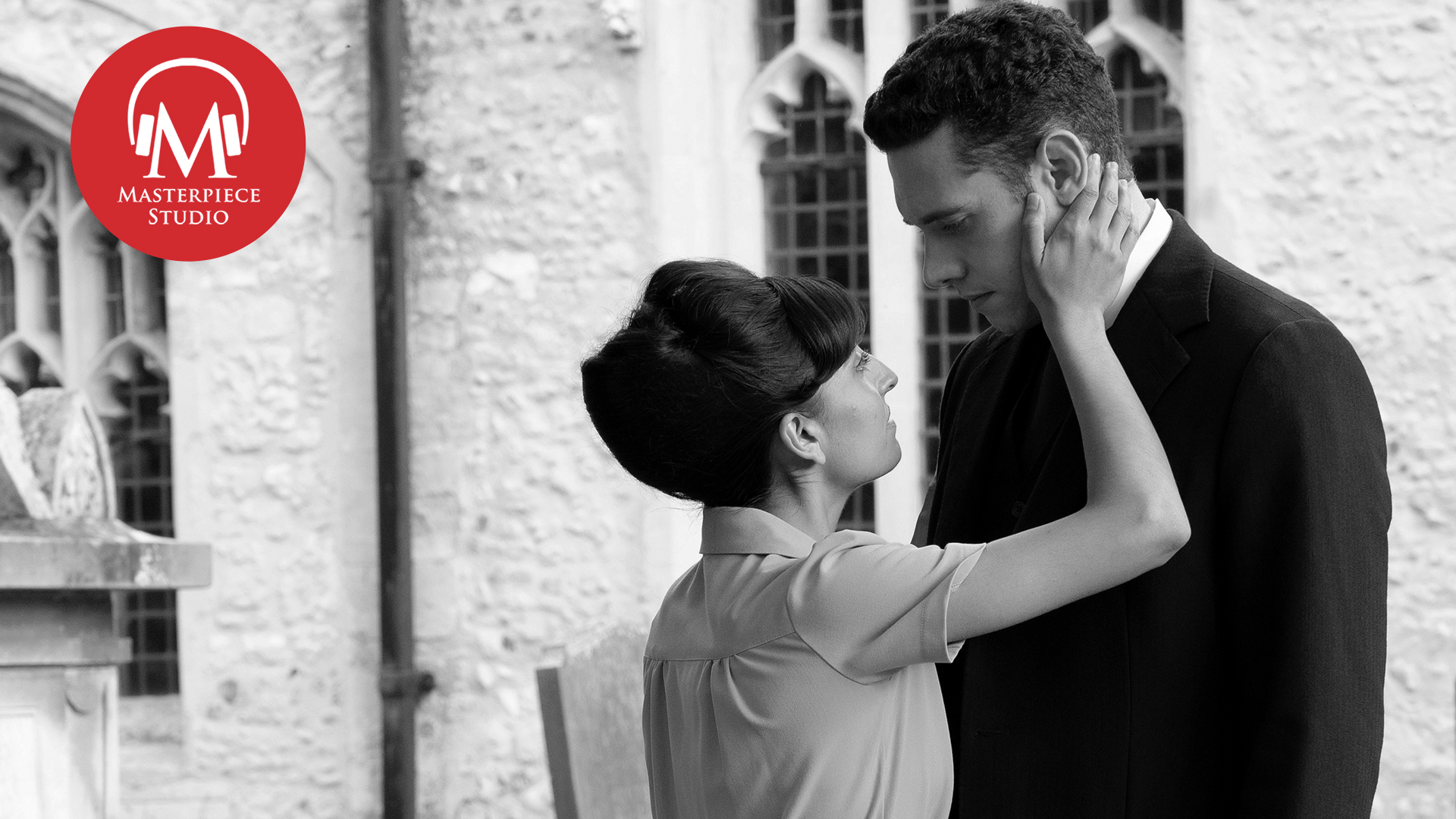

Daisy Coulam Sees A Tonal Shift In ‘Grantchester’ Season Seven
Released 33:38
Related to: Grantchester, Season 7
Download and subscribe on: iTunes | Spotify| RadioPublic
Transcript
Jace Lacob: I’m Jace Lacob, and you’re listening to MASTERPIECE Studio.
If you’re a regular listener to this podcast and a regular watcher of MASTERPIECE Mystery!, we’d think you’d know by now to not trust Grantchester head writer Daisy Coulam.
CLIP
Geordie We had an emergency call from this property.
Melanie I didn’t call.
Geordie Your husband home?
Melanie He came home early from work. He cut his hand on a letter opener, damn fool. He’s resting.
Will Might we speak with him?
Jace Much like the would-be suspects in her long-running mystery series, Coulam is full of secrets.
CLIPs
Will Did you love your husband?
Melanie For the most part.
Will That’s an odd answer.
Melanie Have you been married?
Will No.
Melanie It’s not odd if you’ve been married.
Jace And Coulam knows exactly what big crises await our friends Will and Geordie in the later half of this season — but she keeps them all quiet, per usual.
CLIP
Will Do you ever feel elated one minute and then guilty the very next?
Bonnie All the time. I’m a mother. Do you love her, d’you think?
Will D’you know, I think I do. Haven’t even told her yet.
Bonnie I’m not sure I’ve ever been in love.
Will You were married.
Bonnie I thought I was. That’s what you do when you’re 18, isn’t it? You think you’re in love. Never told anyone that either.Jace Fortunately, Coulam is a good sport, and agreed to return to our podcast for another careful conversation about our favorite Grantchester gang.
Jace And we are joined once again this week by Grantchester writer and executive producer Daisy Coulam Welcome.
Daisy Coulam Thank you. How many times is this?
Jace Oh, God, I don’t know. I’ve lost count. I don’t know.
Daisy That’s a good sign, I think.
Jace It is. It is. I mean, Daisy — series seven. Can you believe it? I mean, when you first developed Grantchester, did you ever imagine that it would hit seven series?
Daisy I never, never, never, never. I remember getting to the end of series one and thinking, ‘Well, if that’s it, then, you know, that was a good go.’ And then, I think actually after every series, we kind of went, ‘Oh, well, you know, we had a good run. ‘ And then we just kept going. Yeah, seven. Seven sounds good, doesn’t it?
Jace It’s a good number. It’s a lucky number.
Daisy A good number is a lucky number. And also, I don’t know, it just feels like we’ve managed to, in story terms, almost cover a decade, which feels quite interesting, really.
Jace You have covered the breadth of the 1950s here. Things seem like they are changing, especially this series in, a number of ways, which we’ll talk about. I do want to ask —Grantchester combines both mystery and morality plots. It blends together procedural crime elements with serialized character arcs in a way that few other shows really pull off as effectively.
CLIP
Melanie Killed by a child’s toy. It’ll be funny if it wasn’t so bloody tragic.
Geordie Bank statement for your husband’s business.
Melanie My business.
Will It’s in your husband’s name.
Melanie He liked to control our finances.
Jace Do you feel that this this combination of character-forward drama and murder-mystery plotting contributed to the longevity of the show?
Daisy I think so. I think it’s really I was talking to my mum about it the other day and she said, ‘Oh, I do love Grantchester, but I don’t watch it for the murder.’ I was like, ‘Okay that’s half of it. But, fine.’ I think you could come to it as a character show, or you could come to it as a crime show. And because it’s wrapped up in an hour, you get a satisfying hour, you know, of a of a murder and a resolution. But you also, I mean, I think it’s no secret, really, that the character stuff is my favorite bit. But I think you can take what you want from it, really, you can, and you can get satisfaction from two elements.
Jace No it is a sort of ‘choose your own adventure,’ aspect to this show that you can, as you say, sort of come for the characters or you can come for the murder and come for both.
Daisy Yeah.
Jace And either way, you’re sort of getting… or the or the beautiful scenery. I mean, you’re getting all of those sort of served in a single episode.
Daisy Yeah.
Jace The world has changed a little bit since you shot series six of Grantchester at the very height of lockdown.
Daisy Yeah.
Jace Even with many of those COVID safety protocols still in place, did making series seven feel different to its predecessor?
Daisy It did. I mean, we were still…season seven was still COVID-y in the sense that everyone tested, and you had to wear masks and it was all very controlled. But somehow, and the series reflects this, there was hope and there was a sense of, ‘We’re coming out of this. We’re moving on.’ It’s so weird. Now, I find it really weird that we talked to each other in the depths of lockdown and it felt like there was going to be no end. And now I think, weirdly, there’s this sort of feeling of ‘Did that really happen?’ But for us, season seven had had a lightness about it and had had a joy about it, not least because, you know, we got to go to set and see and hang out. And, you know, we had a few drinks because we in England, the lockdown meant you could meet outdoors again. So there was a sort of relaxing and you kind of get that in the storylines in there and the show really, I think.
Jace Less prison, more outdoor celebration.
Daisy Exactly. I mean, yes, I mean, you don’t I think it was a metaphor. I don’t think we were that clever, but when you look at it, you’re like you can see it. Yeah.
Jace There’s been a lot of change since we saw the Grantchester folks at the end of series six. Geordie has moved in with Will at the vicarage after Cath kicked him out at the end of series six.
Daisy Yeah.
Jace Leonard and Daniel have set up a café. Given these changes, what sort of discussions were there in the writers room about reconfiguring?
Daisy Series six fractured a lot of things, like, Leonard lost his job and Geordie lost Cathy, and Will was still in this sort of hinterland of being a man-child. And I think what we wanted to do was we knew that this was a season where things…it’s a sort of coming back together and an acceptance of change. And for us, this season was all about love and how you recognize true love, how you rekindle love that you’ve lost, how, I mean, every story, how you protect the things that you love, everything seemed to come back to that again. Probably reflecting our sort of new sort of optimistic state of mind.
Jace Which is, I mean, it does, I feel like it does reflect that there is a tonal shift between these two series, that is very clear to me, and I think especially becomes clear by the end, no spoiler. The series has gone through many transformations over the years, but at its heart was always a found family. The vicarage to me sort of provided a nexus space for the characters to pass through. But with Leonard defrocked in season six, was there a conscious effort to, how can I say this, find a replacement space that would allow for that connective tissue?
Daisy Well I think because it is, it’s about in a way Geordie and Will’s friendship has created this family, and it’s created the vicarage family, but obviously now it’s extended into this café, which is a safe place for others. And it’s allowed Leonard to become himself. And I think that’s what we always wanted to do, really, was show a family of sort of misfits, I suppose in a weird way, they are a family of misfits who are allowed to become themselves in with the comfort of that family. You know, Leonard is starting I feel like he’s starting to blossom in this series. He’s starting to wear turtlenecks and stuff and sort of become himself in a way that he never has before.
Jace Where did the idea for Leonard’s newly secular path in life come from? How did you end up settling on the Cherry Orchard Café?
Daisy Leonard’s journey is not going to be an easy one, from, because, you know, the church was his vocation. It was it was his meaning and his purpose. We wanted to show this transition to being his new self was not going to be easy, and. And he’s doing something great. The café is great, and it’s a place for, you know, terrible poetry and hot cross buns, but is it really in the end will it satisfy him enough? He needs something with a bit more gravitas, and that’s really helping people. So that’s his transition across the series is really realizing what is it he wants to do outside the church that makes him whole.
Jace Hmm…I mean, the café, too, it does showcase the changing culture of 1959 as much as the jazz clubs that Will visits. I mean, as you say, the sort of bad beatnik poetry, their black turtlenecks. Do locations like the Cherry Orchard or Swinteron’s afford you that ability to explore the social or cultural shifts that are happening in the background of the series?
Daisy Yeah. And it just gives you a bit of color and texture, I think, those sort of sets. I mean, I miss Swinterton’s actually. I really enjoyed that set. But as soon as they get built, they get knocked down as soon as that story’s over, you just think. No. And yeah, I did really enjoy the café, actually, because, well, it was Leonard’s domain. And anything that’s to do with Leonard,. I’m quite happy to hang in his world, even if it isn’t quite what he wants to do. And it’s lovely. I love in episode one, his welcoming poem to the crowds about the cherry orchard, the tree growing and yeah, just gets to have some fun, really.
Jace I mean, you mentioned love. This season definitely explores the notion of love. It also looks at things like truth and the weight of secrets and lies, both the lies we tell others and the ones we tell ourselves, perhaps even more damagingly. What were your intentions with the overarching thematic narrative here in the broadest context? What does series seven say?
Daisy Well, for example, Mrs. C’s story, I think it was one of the first stories we came up with. It was sort of a story about the darkest time in your life, the people around you will help you through it. The people around you are the ones you lean on, and sometimes holding those secrets doesn’t help you. Holding those secrets keeps you from others when you need to ask for help. And in her story, she needs to ask for help. And when she does for Leonard, you just their love becomes stronger, I think, because the vulnerability, she allows herself to be vulnerable. And that was and that was our sort of starting point for the whole series was we need Mrs. C’s story was going to pull it all together.
CLIP
Leonard Mrs. C…are you…And I can’t believe these words are about to pass my lips – having an affair? Is this, in fact, your…love nest?
Mrs. C You’re a very silly boy sometimes.
Leonard Who is he then?
Mrs. C He’s my Doctor. I’m poorly. I’ve been poorly for a while now and…I’m frightened, Leonard. I’m ever so frightened.
Daisy And everyone’s story is about, Geordie has to learn to be vulnerable and truthful, Will similarly it’s about being truthful. And you’re kind of owning your…that’s a very modern way of putting it, but owning your feelings and speaking your truth. I won’t put that dialogue in Grantchester, I don’t think that would work, but yeah.
Jace Before this next question, a brief word from our sponsors…
Jace Will meets Maya aka Ellora Torchia, at a jazz club and quickly falls into bed with her only to learn that not only is she engaged, but her fiancé is Geordie’s new boss, DCI Eliot Wallace. How does Maya test Will’s resolve and how does he truly feel about her knowing what he does?
Daisy Again, that was another theme of the series was this this sort of pull between she represents modernity, really. She represents the modern woman and adventure and travel and excitement and all the things the new world is promising.
CLIP
Will Leave him.
Maya Will…
Will Let me imagine. Just for a moment. We can go off on the bike. Wherever we want.
Maya I’ve always wanted to go to Rome.
Will I want to drink wine, dance under the olive trees.
Maya You’ll have to learn how to dance first.
Will Maybe we’ll get married out there. We’ll have kids.
Maya I think I prefer the dancing and the olive trees.
Daisy Maya is the promise of a different kind of future, a sort of restless, reckless future. And Will’s chasing that. But is that the right thing to be chasing? Is that what he really wants? And then that’s when Bonnie comes onto the scene.
Jace We’ll talk about Bonnie in a minute.
Daisy Yeah.
Jace Grantchester has excelled at being inclusive in terms of its storytelling and behind the camera, which is a rarity for period dramas. In many shows, Maya would have been played by an Anglo actress. Did you specifically write her as being southeast Asian, or was it more a matter of meeting Ellora?
Daisy It was, we actually, for once, we did it deliberately, actually, because we thought there was something interesting. I was interested in the idea of a girl who, from a very wealthy background who had been sent over to boarding school and had this very kind of sort of free upbringing that she’d sort of grown up alone, really, so had had her independence, wasn’t tied down to anyone and was quite grown up, more grown up than Will is. And so we started from that basis, because I’ve met a lot of girls like that in my time who just seem so sophisticated because they’ve been living on their own since they were ten. And yet she’s got this very rich family and this, she’s just got a gravitas that lots of other girls Will has met, haven’t. She’s sure of who she is in a way that Will isn’t.
Jace Her fiancé is the first major authority figure we’ve seen in seven seasons of Grantchester who wants to keep a Vicar from interfering in an active investigation, scuppering Will and Geordie’s crime solving dynamic. Why is DCI Elliot Wallace so against Will’s involvement, even without knowing what’s going on between him and Maya?
Daisy He is, again modernity. He is a 1960s copper in the making. He thought about him as sort of in the way that Geordie is very instinctive and crumpled suit. This man is sharp and plays by the rules and and Will certainly doesn’t fit into the rules. I mean, he’s allowed to do interviews. I’m not sure that’s by the rules. But yeah, he’s a stickler for proper process. And Geordie certainly doesn’t fit into that and Will definitely doesn’t.
Jace I’m curious, which came first in terms of the plotting — Wallace’s identity as Maya’s fiancé or him being a thorn in the side of Geordie’s and Will’s crime solving, was or was it a case of sort of two birds with one stone?
Daisy It was it started off ,they started off as two separate characters. And so, Eliot, he started off as their nemesis in the police station. And then we also had Will having an affair. And then we were like, well, the good thing about combining the two is that you then realize Will’s affair has an impact on his friend. It makes his life difficult, so it makes it much more knotty. And so, yeah, so that gave us a new, interesting dynamic. I think it was in the middle of storylining, we went, ‘Oh, what if?!’ You know, just playing around really. And that made it more sort of emotional rather than just a mean policeman and a very aggrieved husband.
Jace And again, it sort of pulls together those sort of different elements of the show, the crime solving element, the character elements sort of come together, the emotional and the sort of procedural.
Daisy Yeah.
Jace Which works really effectively here. Episode two opens with Will and Maya falling back into bed together, an adulterous act which is juxtaposed with the domesticity of the Carmichael’s advertisements. Was that an intentional contrast, those two elements or jutting against each other, the adulterous and the domestic?
Daisy Yes. This episode for me was all about the faces we give to the world. Mrs. Carmichael and her squeaky clean advert with a beautiful children and the reality which, you know, they’re all at it basically in 1959. Everyone’s kind of having affairs and not behaving themselves because human they’re not they’re not advertisement perfect. They’re not, you know, even Mrs. Carmichael, the children in the advert aren’t her children, she’s like, you know, ‘They’re horrible, horrible little brats, actors.’ So it’s that sort of that was the idea of that episode was to, the face of the world and the what’s happening behind the door of that nice cottage in the pretty cottage of the nice lady answering the door.
Jace This episode also introduces Bonnie Evans, Cath’s niece, who has been enlisted to help Cath with the kids. Bonnie is of course, played by the always amazing Charlotte Ritchie. How did Charlotte’s casting come about and what does she bring to Grantchester?
Daisy She, my God, we were so happy. She’d always been in our mind because she is the perfect, we wanted somebody who was really unaffected and fun and you want to hang out with her and you want to be you just know that her and Will, they should, you know, they will click on a friend level and they make each other laugh. And so we put it to her and we thought, there’s no way because Ghosts is such a mega-hit. I’m sure Ghosts, you have Ghosts over there and it’s such a mega-hit and she does so much work. And she said yes! And she and it was we were so over the moon. And she just brings a just a lightness and a fun and she’s a really good actress. And her and Tom and I’m sure you’ll ask Tom about this, but he they get on so well. They were just it was like there’s a scene in a restaurant in episode four where Will does a kind of chef’s kiss and she takes the mickey out of him. And, and I’d written that and we were in a pub in Grantchester, in real Grantchester and he did that and she laughed at him. And I went, ‘You’ll never guess, but I’ve written that in the script.’ It’s, they had the same bantery relationship, but it’s pretty sweet.
Jace Oh, I love that. And I love that moment. To me, there’s this sort of puckish quality to Bonnie that I love. She might be a widow. She’s a single mum, but she’s not cast here as a sort of tragic figure. She has this sort of vitality and wittiness that makes her more than Will’s sort of equal. Where did the notion of Bonnie as a character come from? How did you know that this was the time to introduce her?
Daisy The notion of Bonnie, we wanted somebody who she wasn’t for once wasn’t pining after our lead man who is his equal, who was vibrant and funny and intelligent and challenged Will in ways he’d never been challenged. Who doesn’t believe in God. And she and, you know, on paper, Bonnie is traditional. She’s a wife. She’s a mother. You know, she’s got all the things from the 1950s that women should have. But yet she’s the one who’s progressive. I think. She’s the one who sees beyond her position and is just fun, really. We wanted to have her to be fun.
Jace She to me, gets introduced in the most Daisy Coulam-esque way imaginable. She’s doing a handstand, and she accidentally tucks her skirt into her knickers in front of the vicar.
CLIP
Bonnie Oh! Hello! Mr Davenport! I have heard so much about you. All good. Don’t worry.
Will I’m sorry, do I know you?
Bonnie I’m Bonnie.
Ernie Mrs. Bonnie Evans.
Bonnie This is my son, Ernie.
Ernie How’d you do?
Will How do you do. Umm…
Bonnie What?
Will Your, er your skirts still…
Bonnie Oh. That’s not what you wanna see first thing in the morning.
Jace What does this say about Bonnie and how did you settle on this image as your introduction?
Daisy Well, I suppose I wanted her to be somebody who kicks it off as well and who sort of didn’t care what people thought. You know, she’s doing handstands in the garden and she, you know, it’s a bit embarrassing that you’ve seen her knickers, but then she makes a joke about it. It’s just irreverent, I suppose, and he’s reverent…or a reverend. She brings out something in Will which we’ve not seen before, I think. Less serious.
Jace Well, he does manage to open up to her in a way that feels really unguarded when they talk about the sort of big three sex, love and shame. And there’s this this really sort of comfortable, immediately comfortable quality in their rapport that I think surprises both of them. How did how should viewers read that scene where he’s showing Bonnie around Cambridge? And what was it like sort of writing that scene and getting them so close, so quickly?
Daisy It was great. And also we sat on set for that, too, to film it. And so that scene was used in what we call a chemistry reading for Tom to sit with the girls that we sort of brought together, too. And we just didn’t. I mean, you see him and Charlotte do it. And it’s basically what we were trying to say was these people are perfect for each other, but they don’t know it yet that this is their When Harry Met Sally moment in the car, you know, that they were that they’re going to challenge each other and they’re going to be spiky, but they’re also just they fit straight away. They’re easy with each other. That’s what we wanted from that scene.
Jace You just want to slap them and tell them to get on with it at this point.
Daisy Yeah, exactly. Come on! But then it would be a very short series.
Jace It would be. But much of the crime in this in this episode, as you said, it sort of centers around the notion of fantasy. I mean, does that connect at all to Will’s desire for Maya if she does represent the sort of, as you say, sort of travel and modernity? Has he constructed a fantasy of who she is and what their romance means that’s at odds with reality?
Daisy Yeah. He talks about dancing, and let’s go to Rome and dance in olive under olive trees. And it’s completely…he knows it’s impossible on some level, even at start is sort of doomed from the start, but they can’t. Despite that, he knows that it will never happen. He knows it can’t be. Which makes Bonnie in a way the contrast is that Bonnie can be. Bonnie should be. But he just it just, he needs to acknowledge that she’s right for him.
Jace I mean, he says, ‘I can’t I can’t pretend anymore,’ when he decides to walk out on Maya and to reject the illusion or fantasy that they’ve spun for themselves in this sort of cocoon.
Daisy Yeah.
Jace I mean, does he have the realization here that she’ll never leave Elliot or that he’s in love with her but can never have her? Or is it just that this dream has been punctured at this point?
Daisy Yeah. And I think for us, Maya was always a character who won’t be defined by her relationship. Who probably is, it could, it could happen. It could you know, they could run off to Rome. But the fact is, Will is sort of kidding himself that he will do that. I think he can’t commit as many men can’t. He finds it difficult to sort of, he did this and he can’t make that decision. She’s she’s like, ‘Let’s just go, let’s just go.’ And he can’t bring himself to because he just needs to grow up. We say this every series. ‘Will, just grow up. Grow up Will realize what you’re doing.’ Yeah. So that was what it was about, really.
Jace Elsewhere. I love the burgeoning friendship that kicks off in this episode between Cath and Miss Scott. Jennifer Scott, that is. How much fun are these two to write together and can we expect to see more of this pairing this season?
Daisy Yes, for sure they are. They’re just a joy really, aren’t they? And also because we felt like Miss Scott was the the sort of well, the feminist character in the in the station and Cathy’s own been on her own journey of discovery about her, her worth and her career. And it just seemed to fit that those two would become friends, much to Geordie’s chagrin. They’re really sweet, I like them together, and actually I’ve said, I can’t say this Miss Scott is fast becoming I said this actually, I can’t say that she’s one of my favorite characters because they all are. But she’s fun. She really is. Yeah, she was fun to write, that.
Jace On that note, one of the overarching themes of this episode is women taking control of their own business, whether that’s professional or personal and their sense of agency as we see the sort of first glimmers of second wave feminism approaching in 1959. Was capturing this nascent sense of female empowerment a goal, then, for the writers this season?
Daisy I think so. I think Emma and I, Emma the exec producer and I, we were always banging on about, you know, I think our goal is always to let the women have their moment to shine. And then John Jackson was back again and lots of other writers. And it was just also because it’s fast approaching 1960 and which is the most fundamental change in this country, especially when you’re and your country as well. Things changed so dramatically in that decade and we’re just on the cusp of it were just there and things are the little glimmers of hope are starting to show and to show that is good.
Jace Leonard and Mrs. C’s relationship has had its ups and downs, but there is such an understated beauty in the way that Sylvia doesn’t correct the doctor when he assumes Leonard is her son and asks if he’d like to accompany her. What does this small moment mean to both of them?
Daisy I think. In that moment, it means everything, really, isn’t it? I mean, she. Well, it’s a it’s a sort of symbol of how far they’ve come from series three, I think, where she discovered his homosexuality and struggled terribly with it through the court case, where she rejected him through you know, they’ve been through all these steps along the way. They’ve struggled. And in that moment she acknowledges that the feelings she really has for him, which is that she loves him terribly. Oh, I’m getting emotional. And I just I love that moment because it’s quite small, but you sort of get it. You get everything. And also, I really love the way she thanked the doctor at the end of what he tells her, she says thank you. Like, as I imagine many women in those times did because, you know. A working class women and a professional man. It’s like you just I just like these scenes. And I love Leonard and Mrs. C across this series, actually, they do some nice stuff.
Jace I mean, The doctor rather sort of condescendingly delivers this diagnosis without much feeling or sensitivity and drops this bombshell on the two of them before walking out. How does this storyline continue to play out this season? What can you tell us about where it might be going?
Daisy Well, this is one of Mrs. C’s dilemmas. How does she something so fundamentally private and terrifying? How does that, how do you share that with people you love? And Leonard is sort of her guide through it, really. And he and they have what you wanted to do with the cancer story. I had cancer about ten years ago. And what my journey — that’s such a terrible, terrible modern word. But what I learned through it was that it’s not always sad. It’s not always I mean, it’s horrible, but it’s also still funny. And there’s still moments where you laugh and where you have too many glasses of wine. And I don’t know, Mrs. C and Leonard go off together to a restaurant in episode four and have quite a sort of outrageous time. She, Mrs. C goes, you know, we see a different side to her through this journey, not just a sad, you know, reflective, maudlin side. And I think it’s and it gives her a chance to sort of open up about some old wounds as well.
Jace Now, I was going to ask, I mean, you you’ve been open about your own thyroid cancer journey. I’ll use ‘journey.’ But I mean, I hope that your experiences were handled better than Sylvia’s. And did you draw on your own experience to sort of inform Sylvia’s story here?
Daisy Yeah. I mean, it’s a very different world now because, you know, nowadays they say, ‘We’re going to do this, we’re going to do this treatment and you will be better,’ that there’s no sort of ambiguity, even though in your head you say, you know, you fear the worst and there’s sort of. Whereas in those days, I think it was much more well, it was it was a sort of taboo and and yeah, kind of something to be feared and shamed of. Now it’s well, what, one in two of us will get it. So now, you know, it’s it’s open and a really interesting thing to sort of look at the sort of fear of…it’s death isn’t it, really? I suppose that’s at the end of the day, it’s a fear of death and a fear of your own mortality and what that does to you and what that brings out. And she, you know, struggled with believing in God after some after a diagnosis like that. How does that affect your relationship with God? It’s all that kind of interesting things.
Jace So a storyline about mortality in a show about morality, God, crime and punishment.
Daisy Just that really.
Jace Fitting.
Daisy Yes.
Jace Finally, what can you tell us about what’s coming up this season on Grantchester?
Daisy Ooh, what can I tease? You will have some happy times. Some things you want to happen will happen. Some other things won’t happen. That’s very vague. Romance. Romance, some tears, I hope. Some bits might make people cry. I’m thinking specifically of Mrs. Chapman and Leonard and some terrible beat poetry and Mrs. C doing beat poetry. That’s what you can look forward to, actually.
Jace Daisy Coulam, thank you so very much.
Daisy Thank you. Thanks very much.
Jace Will Davenport might be wearing a few different hats this season of Grantchester — pastor, detective, other man in a complicated love triangle — but so too is Tom Brittney, slipping into the director’s chair for the first time next episode.
CLIP
Jim These chaps are detectives.
Leonard I’m just a hanger-on.
Professor Larson You’re definitely police. You’ve got that crumpled, useless look about you.
Jace Series lead and debut director Tom Brittney returns to the podcast July 24.
MASTERPIECE Studio is hosted by me, Jace Lacob, produced by Nick Andersen, and edited by Robyn Bisette. Elisheba Ittoop is our sound designer. The executive producer of MASTERPIECE is Susanne Simpson.
Grantchester Podcasts 30 More Podcasts
MASTERPIECE Newsletter
Sign up to get the latest news on your favorite dramas and mysteries, as well as exclusive content, video, sweepstakes and more.











